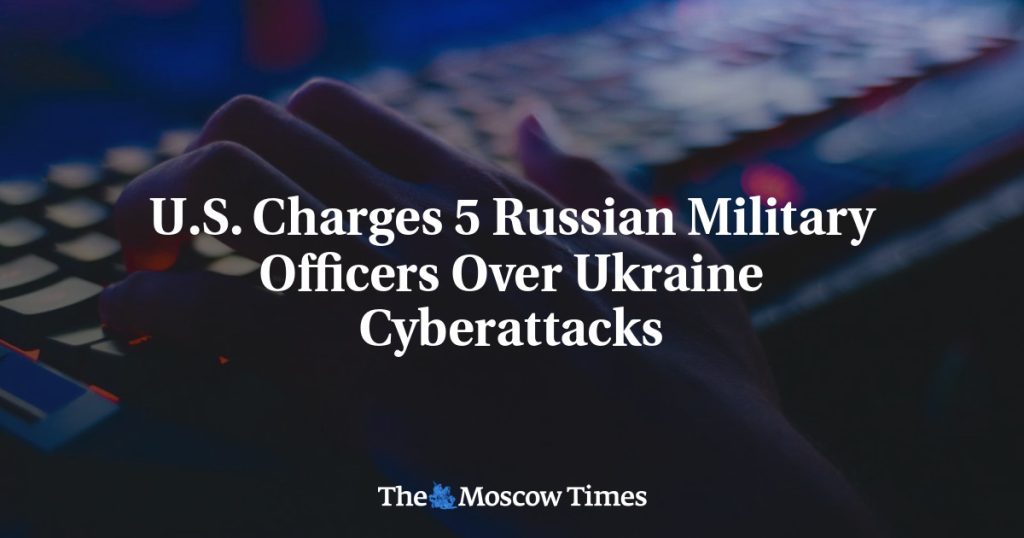The United States has charged five Russian military officers for allegedly conducting cyberattacks on civilian infrastructure in Ukraine ahead of the Russian invasion. The cyber campaign, known as WhisperGate, targeted Ukrainian computer systems unrelated to the military or national defense. The attack in January 2022, which could be seen as the first shot of the war, aimed to cripple Ukraine’s government and critical infrastructure by targeting various sectors including financial systems, agriculture, emergency services, healthcare, and schools. The cyber campaign also targeted computer systems in the United States and other NATO countries supporting Ukraine, showing a broader impact beyond Ukraine.
A Russian civilian, Amin Timovich Stigal, was indicted in Maryland in June on charges related to WhisperGate. Stigal and the five Russian GRU members indicted remain at large, and the State Department has offered a combined $60 million reward for information leading to their arrest. Stigal’s involvement in distributing WhisperGate malware to Ukrainian government agency computer systems before the Russian invasion was highlighted in the indictment. The cyberweapon was designed to look like ransomware but actually aimed to destroy the target computer and related data. The hacked data, including patient health records, was exfiltrated from computer systems, and websites were defaced to spread fear among Ukrainians.
The indicted GRU officers were identified as members of a subset of unit 29155 within the Russian Main Intelligence Directorate, responsible for various deadly operations around the world. The charges revealed a sophisticated cyber campaign orchestrated by Russian military personnel, targeting civilian infrastructure and essential services in Ukraine. The unsealing of the indictment followed accusations against Russia’s state-funded news outlet RT for attempting to influence the 2024 U.S. presidential election. Attorney General Merrick Garland also announced the seizure of 32 internet domains linked to an alleged Russian campaign to secure a favorable outcome in the election, suggesting a broader pattern of Russian interference in global affairs.
The WhisperGate cyber campaign had implications beyond Ukraine, as it targeted computer systems in NATO countries supporting Ukraine, including the United States. The attack, intended to disrupt critical infrastructure and essential services, underscored the evolving nature of cyber warfare and the challenges posed by state-sponsored cyberattacks. The indictment of the Russian military officers and civilian involved in the cyber campaign highlighted the need for international cooperation to combat cyber threats and hold those responsible accountable for their actions. The involvement of civilians like Amin Timovich Stigal in cyber warfare activities further blurred the lines between state and non-state actors in cyber conflict, raising concerns about the growing influence and capabilities of individuals in conducting disruptive cyber operations.
The U.S. Justice Department’s announcement of the WhisperGate indictment and the related cyberattacks underscored the complexity and severity of modern cyber threats, particularly when conducted by state actors. The indictment highlighted the destructive nature of cyber weapons and their potential to cause significant harm to critical infrastructure and essential services. The indictment also highlighted the need for increased cybersecurity measures and international cooperation to detect, prevent, and respond to cyber threats effectively. The broader implications of the cyber campaign on global cybersecurity underscored the growing significance of cybersecurity in national security and the need for effective strategies to address evolving cyber threats from state and non-state actors.
The indictment of Russian military officers for conducting cyberattacks on Ukraine and other countries reflected a broader trend of state-sponsored cyber aggression in international affairs. The charges against the Russian military officers and civilian involved in WhisperGate underscored the increasing sophistication and boldness of cyber operations orchestrated by state actors. The unsealing of the indictment and the subsequent accusations against Russia for attempting to influence the U.S. presidential election highlighted the multi-faceted nature of modern cyber conflicts and the challenges posed by hybrid warfare strategies. The cyber campaign against Ukraine and other countries illustrated the evolving landscape of cyber threats and the urgent need for coordinated efforts to address cybersecurity challenges on a global scale.














